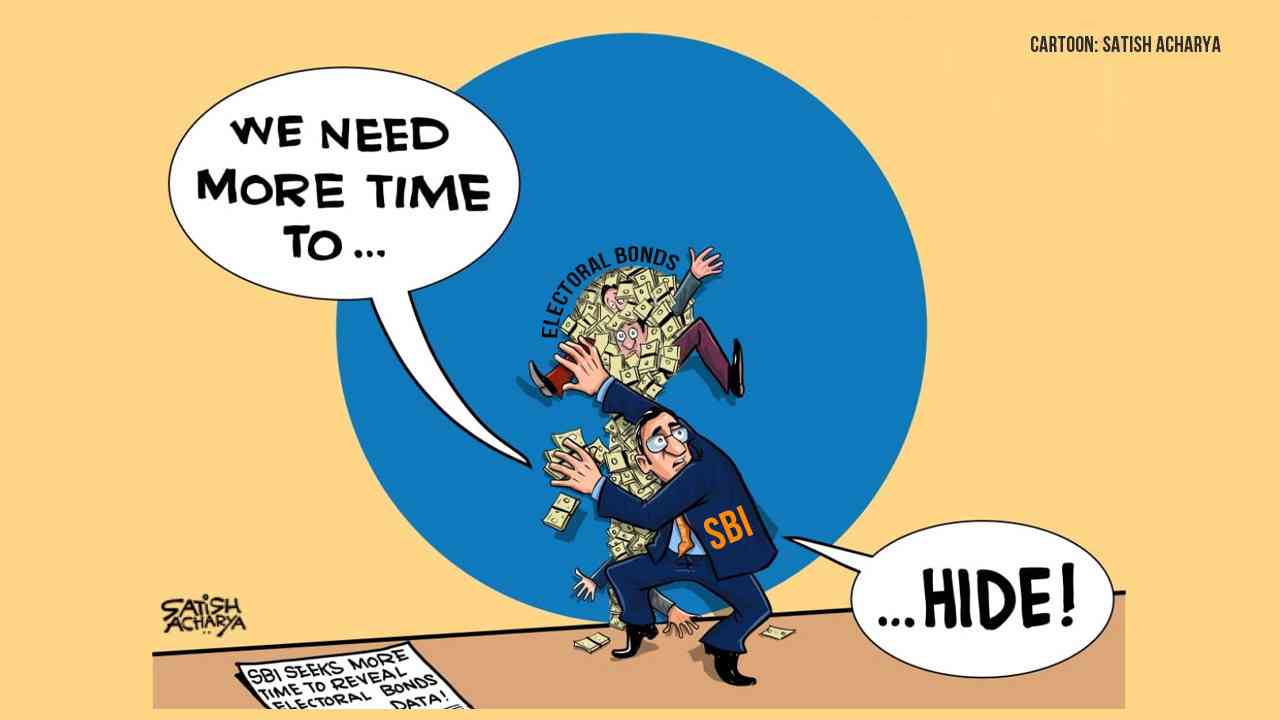Disclose Full Electoral Bond Details: Let India See the Real Modi Family of Corporate Cronies

While striking down the Electoral Bond scheme as unconstitutional, the Supreme Court had asked the State Bank of India, the issuing agency of electoral bonds, to disclose full details about the bonds issued and encashed during the pendency of the EB case before the Supreme Court. The deadline for the SBI to disclose the donor, recipient and amount details to the Election Commission of India was 6 March while the EC was to publicise the information by 13 March. The Supreme Court order was issued on 15 February and the SBI had full three weeks to comply with the order. But just two days before the deadline, the SBI has now sought time till 30 June to furnish the details.
The SBI prayer is based on the pretext that the number of the bonds is too staggering for the data to be processed in such a short time. According to the SBI, 22,217 bonds have been issued between April 2019 and February 2024 and it is not physically possible for the bank to furnish the issue and encashment details for so many bonds within the stipulated time frame. Banking and computing experts familiar with the process of handling such data are surprised that in this era of digital banking India's biggest public sector bank could make such a ridiculous appeal demanding nearly four more months to furnish basic information regarding bonds that have been issued and encashed by no other nodal agency but the SBI.
The purpose behind the SBI appeal is obvious. By June 30 elections will well be over and hence the identity of the biggest donors to the BJP will not be revealed to the electorate. In other words, even after the abolition of Electoral Bonds, the anonymity granted to the Modi regime's corporate cronies would remain intact at least till these elections are over. While central agencies like ED and CBI are being used to target the political opposition, financial agencies and regulatory institutions like SBI and SEBI have been roped in to protect the Modi government's close nexus with the big corporates. At a time when Modi is claiming the entire country to be his family, he is desperate to guard the corporate core of his real family by violating all laws and undermining all institutions.
The SBI prayer before the Supreme Court is actually an expression of the executive's utter contempt for the judiciary. In the recent past the government has on two different occasions expressed its contempt for the Supreme Court by overturning two crucial Supreme Court orders with hurriedly passed dubious legislations - first by stripping the elected government of Delhi of its powers upheld by the Supreme Court and then by vesting the government with overriding powers in the appointment of the Election Commission. The Electoral Bond issue where the government has already got away with an unconstitutional scheme of anonymous corporate funding for as long as six years yielding more than six thousand five hundred crore rupees to the BJP's coffers, is the third major point of friction between the government and the Supreme Court.
While the SBI is using a technical plea to defer the execution of the Supreme Court order, Narendra Modi has already openly ridiculed the apex court's Electoral Bond verdict by invoking the Krishna-Sudama analogy. In the legendary Krishna-Sudama tale, Krishna's childhood friend Sudama, a poor Brahmin, gave him some handfuls of rice as a token of friendship and Krishna reciprocated by turning Sudama's huts into palaces. Modi wants us to believe that the thousands of crores of rupees donated by the corporates are comparable to the handfuls of rice that poor Sudama had brought for his friend. And all the benefits his government is showering on the Adanis and Ambanis are just pure friendship without any quid pro quo consideration. The unscrupulous use of the mythological epic heroes Ram and Krishna to justify the Sangh-BJP hate campaign to divide the people on the one hand and appease the all-powerful corporates on the other could not be more brazen.
The nexus between the Modi regime and India's top corporate groups has resulted in unprecedented concentration of political and economic power in a few hands. While monopolisation of political power by the Modi government has completely upset India's federal balance and competitive electoral democracy, the growing control of a few oligarchs like the Adani and Ambani groups over the entire economy is landing the overwhelming majority of India's workers, farmers, small traders and the job seeking youth in a permanent state of misery. Defeating the Modi regime in the coming elections is therefore the first step towards freeing the Indian people and India's constitutional democracy from this fascist corporate stranglehold.
Charu Bhawan, U-90, Shakarpur, Delhi 110092
Phone: +91-11-42785864 | +91 9717274961 E-mail: info@cpiml.org

